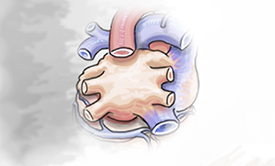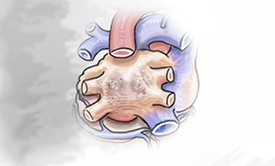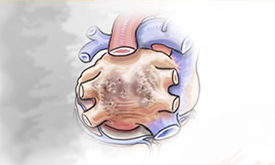- Healthcare Professionals
- Patients & Caregivers
- About AtriCure
- Canada, Central & South America
Atrial fibrillation (Afib) is an abnormal heart rhythm caused by erratic electrical signals in the heart. A normal heart rhythm creates regular electrical signals that are essential for the heart to beat in a steady, rhythmic way to pump blood to all parts of the body. Sometimes these electrical signals become irregular and the heart beats abnormally.

Atrial fibrillation is a progressive disease.1 Unfortunately, atrial fibrillation is often undiagnosed or undertreated. If not properly treated, atrial fibrillation can become worse. There are several stages of atrial fibrillation, depending on how long it lasts.

| Paroxysmal means occasional. This stage of atrial fibrillation starts and stops on its own. It can last from 1 to 7 days. This is the first stage of atrial fibrillation. | Persistent atrial fibrillation lasts beyond 7 days and as long as one year. If not treated, atrial fibrillation may advance to the long-standing persistent stage. | Long-standing persistent atrial fibrillation symptoms continue beyond one year without stopping. |
| EARLY STAGE | ADVANCED STAGES | |
 |  |  |
| Symptoms for Early Stage Atrial Fibrillation: palpitations, fluttering feeling in the chest, or a rapid, irregular heartbeat. If not effectively treated, atrial fibrillation may progress to more advanced stages. | Symptoms for Advanced Stages of Atrial Fibrillation: Chest pain (angina), chest pressure, lightheadedness, or low blood pressure.2,3 Some people with atrial fibrillation may not be aware of their symptoms and are only diagnosed when they see their physician. | |

| Paroxysmal means occasional. This stage of atrial fibrillation starts and stops on its own. It can last from 1 to 7 days. This is the first stage of atrial fibrillation. |
| EARLY STAGE |
 |
| Symptoms for Early Stage Atrial Fibrillation: palpitations, fluttering feeling in the chest, or a rapid, irregular heartbeat. If not effectively treated, atrial fibrillation may progress to more advanced stages. |

| Persistent atrial fibrillation lasts beyond 7 days and as long as one year. If not treated, atrial fibrillation may advance to the long-standing persistent stage. | Long-standing persistent atrial fibrillation symptoms continue beyond one year without stopping. |
| ADVANCED STAGES | |
 |  |
| Symptoms for Advanced Stages of Atrial Fibrillation: Chest pain (angina), chest pressure, lightheadedness, or low blood pressure. Some people with atrial fibrillation may not be aware of their symptoms and are only diagnosed when they see their physician. | |
Atrial fibrillation causes physical changes to the structure and shape of the heart. It can scar and stretch as well as stiffen your heart muscle. If it is not properly treated, it can lead to other health problems. If you have—or continue to have—atrial fibrillation, you are at 5 times higher risk for stroke.4 It is important to talk to your health care provider if you believe you have atrial fibrillation, or if you have atrial fibrillation and your current treatment is not working.
Scarring
Atrial fibrillation can lead to scarring of the atrial tissue. The scarring is also called fibrosis. (The atria are the heart’s upper chambers.)
Stretching
Eventually the heart tissue becomes stretched, too. As the walls of the heart are stretched, the heart muscle becomes weaker.
Stiffening
The heart muscle gets stiffer, so that it’s harder for the heart to pump correctly.
These changes can cause more episodes of atrial fibrillation. Read about the other health problems caused by atrial fibrillation.
If you suspect you have atrial fibrillation, consider talking to your health care provider about how to find the right treatment for your atrial fibrillation. Click here to learn more.
Click here to learn more about Clinical Evidence or Active Clinical Trials and Trials with Results